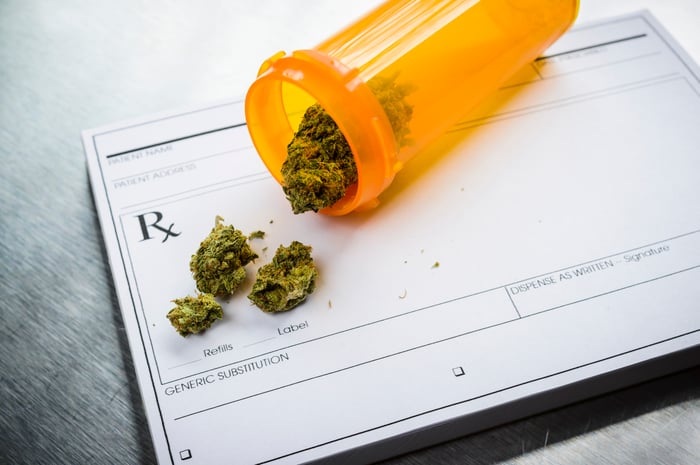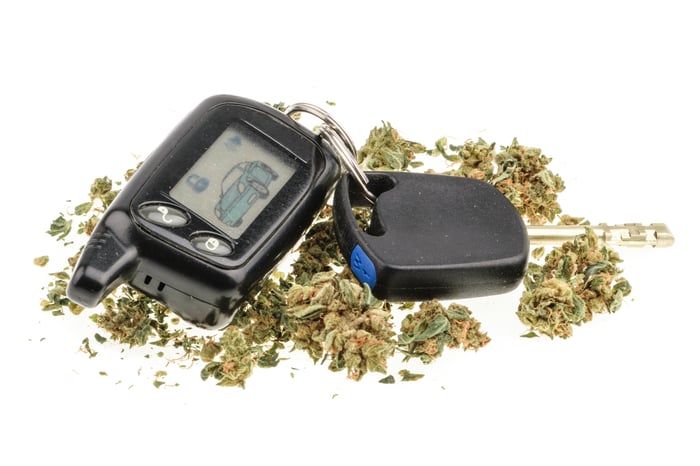Source: fool.com
No U.S. state or territory has done this before.
In a little more than two months -- Oct. 17, to be precise -- the cannabis landscape will change forever. That's the date when Canada will officially wave the green flag on recreational marijuana sales to adults, becoming the first industrialized country to do so, and only the second country overall to have legalized adult-use pot (the other being Uruguay).
Allowing the sale of recreational marijuana is expected to generate in the neighborhood of $5 billion in added annual sales on top of what the industry is already bringing in via domestic medical sales and exports. These big dollar figures are why investors have pumped up pot stock valuations over the past two-plus years.

IMAGE SOURCE: GETTY IMAGES.
This U.S. territory is looking to make marijuana history
But Canada is far from the only country, territory, or state, moving legal cannabis forward. As reported by Forbes, one U.S. territory appears to be on the verge of giving the green light to adult-use weed: the Commonwealth of the Northern Mariana Islands (CNMI), which boasted a population of nearly 54,000 people as of the 2010 U.S. Census.
In May, CNMI's Senate voted in favor (six yes votes and three abstentions) of drafted legislation that would end the prohibition of cannabis and allow adults over age of 21 to grow, possess, and use marijuana. As with other U.S. states that have chosen to legalize, the CNMI would tax the product and use the revenue derived from retail sales to fund the implementation of the program and other government functions.
But there was a slight snag to the legislation at the time of its drafting. Namely, revenue-generating bills have to originate in CNMI's House, not its Senate. That issue was rectified this past week, as the CNMI House of Representatives voted in favor of its own similarly crafted legislation (18 yes votes, one no vote, one abstention) to legalize recreational marijuana. Though a few changes were made to the original Senate bill, the House CNMI bill now moves onto the Senate. Given the strong support the CNMI Senate showed for its original bill, it appears likely that recreational marijuana will soon be legalized.
What makes this legalization even more unique is that it's being done entirely through the legislative process. In other words, residents of the CNMI aren't voting on whether they want recreational weed to be legal -- it's being done entirely by lawmakers in the House and Senate.

IMAGE SOURCE: GETTY IMAGES.
If you recall, Vermont became the first U.S. state to OK the use of recreational pot in January through the legislative process. The previous eight states to green light adult-use weed had their measures approved by voters via state ballot. However, Vermont doesn't allow the retail sale of marijuana. That means the CNMI's legislative approval of recreational marijuana would represent the first of any U.S. state or territory to allow the retail sale of adult-use cannabis.
In addition, the CNMI doesn't have a medical cannabis industry in place, so this would also be a first for a U.S. state or territory to legalize the whole shebang (medical marijuana, recreational weed, and industrial hemp) in one bill.
Are we nearing a cannabis inflection point?
With the CNMI on the doorstep of legalization, it raises the idea once again of whether we're getting near an inflection point with marijuana in the United States. In other words, are we near a point where the scales could tip toward reform at the federal level? The data would appear to suggest so.
In terms of surveys, the American public overwhelmingly favors legalizing marijuana. Five national polls over the last year have shown support ranging between 59% and 64% for national legalization. Meanwhile, 93% of the public is in favor of allowing physicians to prescribe medical marijuana, according to an April 2018 poll from the independent Quinnipiac University.
We've also seen 30 states give the thumbs-up to medical weed since 1996, including the Republican-leaning state of Oklahoma in June. With three-fifths of U.S. states now actively managing and regulating their cannabis industries, change at the federal level has presumably become more likely.

IMAGE SOURCE: GETTY IMAGES.
Then there's the June 25 FDA approval of GW Pharmaceuticals' (NASDAQ:GWPH)lead drug, Epidiolex, a cannabidiol-based oral solution designed to treat two rare types of childhood-onset epilepsy. At no point in the past had the FDA ever approved a cannabis-derived drug, but GW Pharmaceuticals changed that in June.
The intrigue here is whether this cannabinoid-based drug approval could effect federal change. Schedule I drugs like marijuana aren't recognized as having medical benefits, but GW Pharmaceuticals has clearly proved that thesis wrong.
These hills will be tough to climb
But even with cannabis momentum high, there are few, if any, guarantees that the federal government will adjust its scheduling.
One reason the federal government would prefer to stand pat is the almighty dollar. Even though legalizing marijuana would result in the collection of excise taxes, the federal government is already netting a substantial amount from corporate income tax revenue on pot-based companies. U.S. Section 280E of the tax code disallows businesses that sell Schedule I or II substances from taking normal corporate income tax deductions. The result is an effective tax rate for marijuana companies that can top 70%. If the federal government were to remove marijuana from being subject to 280E, it could be giving up billions of dollars in revenue over the next five years.

IMAGE SOURCE: GETTY IMAGES.
Lawmakers are also concerned about the impact of driving high if marijuana is given the OK nationally. Whereas alcohol impairment has clear guidelines -- i.e., there are concrete blood alcohol content guidelines and tests that law enforcement follow when determining impairment behind the wheel -- there are no official guidelines with cannabis use. Further, breathalyzer devices designed to measure THC in a driver's system are still quite a way from being deployed.
There's also the fact that Republicans currently hold a majority of seats in the House and Senate. Historically, Republicans have a less favorable view of marijuana than Democrats and independents, making it less likely that they'd take up legislation to legalize or reschedule pot. And even if the 2018 elections result in a mixed or flipped Congress, there's little guarantee that President Trump would sign cannabis legislation passed by Democrats into law.
There's no denying that momentum is building in the cannabis industry, but the U.S. is still probably years away from any decisive changes at the federal level.
No comments:
Post a Comment